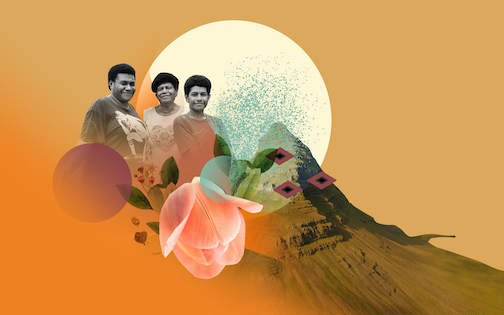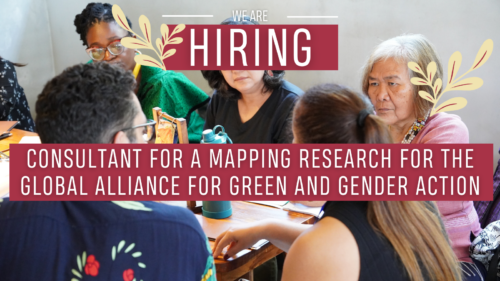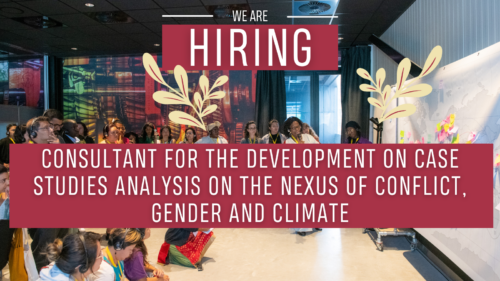Funding feminist climate action in Fiji

There is no question that despite Pacific Island nations’ negligible contributions to greenhouse gases, they are at the forefront of battling our generation’s greatest crisis – global warming.
The impacts of climate change are not only just an environmental or political issue, but also a complex social issue with immense repercussions on the well-being of women, girls, and marginalized groups, who already face injustices due to gendered power dynamics and a lack of control over the use of resources. Studies have found that women and girls are 14 times more likely to die or be injured than men due to a natural disaster. They are subject to a number of secondary impacts, including gender-based violence, loss of economic opportunities, and increased workloads.
Not only are women more affected by climate change than men, but they also play a crucial role in climate change adaptation and mitigation. Women have the knowledge and understanding of what is needed to adapt to changing environmental conditions and to come up with practical solutions. But their knowledge and expertise are still largely untapped resources. Restricted land rights, lack of access to financial resources, training and technology, and limited access to political decision-making often prevent them from playing a full role in building resilience in the face of climate change and other environmental challenges.
Rural and remote communities are more vulnerable and often unseen and underserved in the recovery process given their geographical isolation. According to the findings of the Fiji Bureau of Statistics’ 2019-2020 Household Income and Expenditure Survey, rural poverty is still higher than urban poverty with 62.2% of the poor living in rural areas.
When resources do finally reach these communities, it is again women, girls, and marginalized groups that receive little to no support in their recovery efforts, and their voices remain unheard. Limited representation of women in community leadership leads to their unique needs not being understood and addressed.
At the Women’s Fund Fiji (the Fund), our goal is to shift the power imbalances that prevent the full participation of women, girls, and marginalized groups by providing equitable and flexible access to resources that will help women’s and feminist groups, networks and organizations better respond and adapt to the climate crisis.
Climate justice and humanitarian action has also been included as one of the Fund’s six focus areas of work under our first Strategic Plan for 2022-2024.
Last year, Fiji suffered two severe cyclones and the impact of the global pandemic. Responding to the growing needs of women and gender non-conforming people, especially in the areas of violence and food insecurity, the Fund launched its Resilience Grant, which supports crisis management or crisis activities in the initial or recovery period of sudden onset crises. A maximum of FJD 50,000 (about $US 24,000) is offered annually to the Fund’s current and former grantee partners. Since its launch, the Fund has already disbursed 12 grants to 10 women’s and feminist groups and organizations in Fiji.
The Fund also received technical assistance from the Australia Pacific Climate Partnership to improve its resilience grants and to facilitate access to future climate opportunities for its grantee-partners. The Climate Partnership, which is investing heavily in building Pacific resilience programs, will also support greater private sector investment in climate solutions.
Through our Resilience Grants, the Fund supported Rise Beyond the Reef (RBTR) in its disaster recovery program working with Indigenous women and their rural communities. RBTR has established a long-term, largely self-sustaining value and supply chain program with more than 350 rural women and more than 1,500 dependents. Through their economic empowerment program, they have developed a women-led disaster response network building on the District and Village Coordinator structure established for their supply chain. To date, these rural women’s groups have earned close to FJD 700,000+ ($US 336,000+) through the programs since its inception in 2015. RBTR’s response-recovery framework is both inclusive and one that can be easily scaled up to help restore the dignity of cyclone-ravaged rural and remote communities.
One example is RBTR’s “Shelter from the Storm” program which was created in 2016 following the devastation of Category Five Tropical Cyclone Winston – the strongest recorded storm ever to make landfall in the Southern Hemisphere. Affected communities lost almost all their means of income as crops were destroyed and raw materials (needed for weaving handicrafts) like pandanus (voivoi) and mulberry trees (masi) were decimated.
The program taught artisans to turn the debris left after the storm into value-add products. For example, salvaged hardwood stumps were painted and repurposed as stools and tables. Women turned the flesh of fallen coconuts into oil and animal feed while the coconut shells were turned into jewelry and candle stands. Stones and shells were collected, cleaned and polished, beautifully painted, placed in a small hand-printed drawstring bag and sold as a game called tick-tac-toe. The program also provided portable sawmills to these communities to help them make use of fallen trees to rebuild and repair damaged homes.
RBTR then worked with the communities to develop mid- to long-term economic recovery plans and opportunities for women. This included craft and agriculture inputs, product development and market access support, and the reestablishment of community gardens and food banks to address food insecurity. RBTR ensures that when communities are replanting their crops for both subsistence and income, they are sourcing climate-resilient seedlings and plants.
RBTR replicated the program earlier this year to assist the province of Bua in their recovery from Category Five Tropical Cyclone Yasa which made landfall in December 2020. Bua is on the northern island of Fiji and was already feeling the effects of COVID-19. Through the program, 12 new houses were built and 37 houses were repaired using the sawn timber. The approximate retail value of rough sawn timber processed to date, based on cubic volume, is FJD 300,000 ($US 145,000).
A key component of the program’s success and scalability has been the leadership and participation of women in every step of the recovery process. RBTR ensures that women are involved in rebuilding and decision-making, and that their needs were prioritized. Women were even trained to operate sawmills and in basic carpentry skills.
Women Fund Fiji’s support for women-led organisations like RBTR has taught us that the best solution for Pacific communities in addressing the climate crisis is one that adopts a whole community approach and prioritizes the voices and participation of women, girls and marginalized groups.
About the Authors
Kuini Rabo is a Fijian Development Specialist with over 13 years’ experience working with communities, specifically women’s networks in Fiji and in the Pacific. She has also managed gender and energy projects and is experienced in aid coordination. Kuini worked with the Secretariat of the Pacific Community, University of the South Pacific and with the Government of Fiji and is currently the Programme Officer at the Women’s Fund Fiji.
Erica Lee is a Strategic Communications and Communications for Development Specialist with over 15 years of Pacific-based communications experience. She is passionate about using development journalism to amplify the voices of Pacific islanders, facilitate meaningful participation and foster social change. She has worked for the United Nations Capital Development Fund, Pacific Islands Private Sector Organisation and the Fijian Government. Erica is the current Communications Officer at the Women’s Fund Fiji.
About Women’s Fund Fiji
Women’s Fund Fiji (the Fund) is the Pacific’s first national women’s fund and a partner of the Global Alliance for Green and Gender Action (GAGGA). We are an empathetic and adaptive feminist fund working to influence and mobilise financial and non-financial resources for feminist and women’s rights organisations and movements, so they can progress the human rights of women, girls, and gender non-conforming people in Fiji.
The Fund began implementing its work in 2017 as a five-year initiative of the Australian Government’s Pacific Women Shaping Pacific Development (Pacific Women) programme. The Fund has committed up to AUD10.5 million from 2017 to 2022 to fund and build the capacity of women’s groups, organisations and networks in Fiji to expand and enhance their work on gender justice and human rights. In 2021, the Fund was registered in Fiji as a local entity under Fiji’s Charitable Trust Act and has now a new governance board lead by the feminist and women’s movement in Fiji.
You can also find this blog post in Bahasa Indonesia, French, Georgian, Hindi, Mongolian, Nepali, Portuguese, Spanish and Tagalog.
Above design is by Naandeyeah and photos are courtesy of Women’s Fund Fiji.

We Are HIRING: Consultant for a Mapping Research for the Global Alliance for Green and Gender Action
The Global Alliance for Green and Gender Action (GAGGA) is seeking a consultant to conduct Mapping Research aimed at identifying…

We Are HIRING: Consultant for the development on Case Studies Analysis on the nexus of Conflict, Gender and Climate
The Global Alliance for Green and Gender Action (GAGGA) is seeking a consultant to develop case studies and analysis on…

Report: Seeds for Harvest – Funding for Gender, Climate, and Environmental Justice
The world has drastically changed in recent years, from the COVID-19 pandemic and ongoing conflicts to the rise of authoritarianism…
Subscribe to our newsletter
Sign up and keep up to date with our network's collective fight for a gender and environmentally just world.
